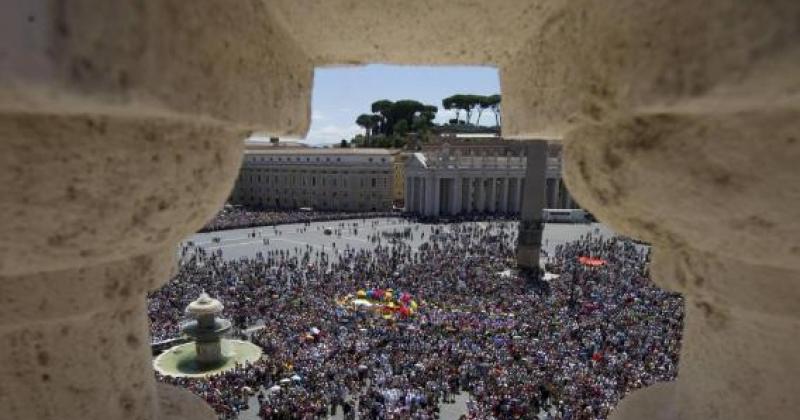At the Angelus Francis appealed for “reconciliation and peace” for the Holy City. Then he warns, “It is better a Church that is not afraid of getting its hands dirty, rather than a Church of “pure ones” who wants to judge who belongs to the Kingdom of God and who does not”.
At the Angelus prayer, Francis calls for peace in Jerusalem and says he is following, "with trepidation the grave tensions and violence of the last days in Jerusalem” along with “the need to express a heartfelt appeal to moderation and dialogue." He then invited all faithful to “join me in prayer so that the Lord may inspire all sides to come together with proposals for reconciliation and peace”.
Commenting on the Gospel of Sunday, July 23, the Pontiff invites believers to "the difficult exercise of discernment between good and evil," and states that it is better "a Church that is yeast in dough, that is not afraid of getting her hands dirty washing the dirty laundry of her sons in public, rather than a Church of "pure ones", who wants to judge before time who is in the Kingdom of God and who is not."
"To always and only look at the evil that is outside of us means we do not want to recognize the sin that is in us," warns Francis, who then reminds the faithful gathered in St. Peter's Square that "we are all sinners" and that "Jesus Christ, with his death on the cross and resurrection, has freed us from the slavery of sin and gives us the grace to walk a new life” and that “with Baptism he also gave us the Sacrament of Confession because we always need to be forgiven of our sins."
In introducing the Marian prayer, the Pontiff speaks of the parable used by Jesus to speak of the Kingdom of Heaven. The parable of "the wheat and weeds illustrates the problem of evil in the world and emphasizes God's patience". The story, the Pope points out, takes place "in a field with two opposite protagonists": on the one hand, "the owner of the field, representing God, who is sowing good seed," on the other, "the enemy, representing Satan, and he is sowing weed". As time goes by, weed grows amid wheat" the owner and his servants have different attitudes on the matter." The servants "would like to intervene by pulling the weeds out, but the master, who is mainly concerned about the salvation of the wheat, objects saying, "because while you are pulling the weeds, you may uproot the wheat with them. Let both grow together until the harvest "
"With this image, Jesus is telling us that in this world, good and evil are so intertwined that it is impossible to separate them and to extinguish all evil. Only God can do this, and he will do it in the Last Judgment.” Therefore, "the Lord, who is incarnate Wisdom, today helps us understand that good and evil can not be identified within defined territories or certain human groups." That is, "He tells us that the line between good and evil runs through the heart of every person”. That we are all sinners. Now, I would like to ask those who are not sinners to raise their hand. Nobody, because we all are" says the Pope.
Therefore, the Pope continues, "It’s about joining, with great confidence in God and his providence, two seemingly contradictory attitudes: decision and patience." "The decision to be good wheat, with all your strength, and then to distance yourself from evil and its temptations." While "Patience means to be part of a Church that is yeast in dough, that is not afraid of getting her hands dirty washing the dirty laundry of her sons in public, rather than a Church of "pure ones", that wants to judge before time who is in the Kingdom of God and who is not."
Then Francis adds, "Jesus teaches us a different way of looking at the field of the world, of observing reality: we are called to understand the times of God along with his outlook." In fact, "thanks to the beneficial influence of an anxious wait, what was once weed or seemed weed may become something good: this is the prospective of hope."
Bergoglio finally invokes the Virgin Mary to help us "grasp not only the dirt and the evil, but also the good and the beautiful; to unmask Satan's work, but above all to trust in God’s action”
After the Angelus, the Pope greets all the faithful in Rome and various parts of the world present in the square, especially the pilgrims of Munster (Ireland); the Franciscan Sisters Elisabettine Bigie; Enna's symphonic chorus; young people from Casamassima who have volunteered in Rome. He then encouraged the children participating in the "Hombre Mundo Shipyard", "committed to witnessing the joy of the Gospel in the most disadvantaged suburbs around the world." In conclusion, he wishes everyone "a good Sunday" and recommends: "Please do not forget to pray for me. Have a good lunch and goodbye!"
